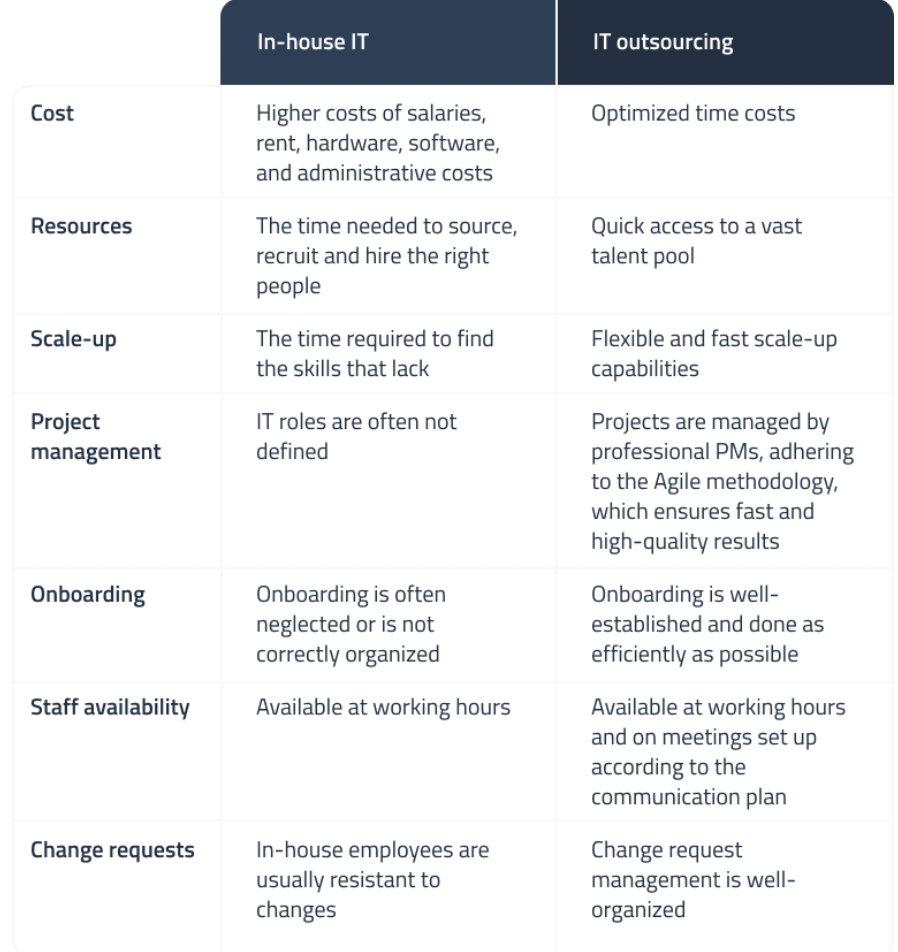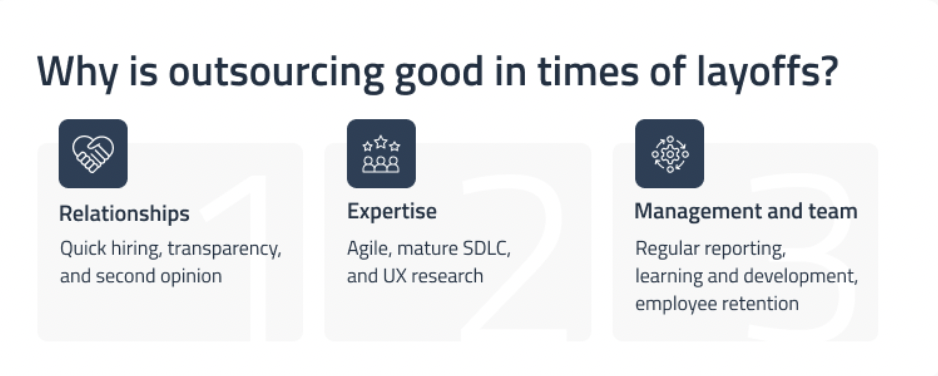In the face of widespread tech layoffs, it is crucial to reconsider hiring strategies, and one potential solution for companies in the fields of software development, technology, and IT is outsourcing. This article aims to compare IT outsourcing with in-house tech teams and explain why software outsourcing is a more favorable choice in today’s circumstances with the benefits of IT outsourcing during challenging times.With frequent tech layoffs, both employers and employees are understandably concerned about the consequences. The recent wave of job cuts is expected to have severe impacts on individuals’ well-being, quality of life, and the overall economy. According to Jeffrey Pfeffer, a business professor at Stanford University, these layoffs can be attributed to a phenomenon known as ‘social contagion.’In essence, companies are letting go of employees simply because others are doing the same. This behavior of imitation becomes apparent when observing the chain of layoffs and the cumulative number of people being affected.
 Top global IT outsourcing enterprises
Source: layoffs.fyi
Top global IT outsourcing enterprises
Source: layoffs.fyi
Table of contents
show
1. IT Outsourcing Vs. In-House IT Departments
In the midst of extensive layoffs and a shortage of IT resources, businesses will continue to require individuals to handle the workload, carry out IT projects, and undertake software development or modernization. Consequently, many organizations will face a decision—whether to hire an in-house team or opt for outsourcing.As evident from the aforementioned points, outsourcing proves to be a suitable choice for those seeking to minimize or streamline software development expenses while ensuring high code quality. Unlike the process of hiring in-house staff, outsourcing provides access to a wide talent pool. This option is particularly advantageous for rapidly expanding development teams that require swift scalability and specialized expertise.Furthermore, when dealing with projects lacking clearly defined requirements that may undergo changes, outsourcing providers handle such scenarios adeptly due to their well-established change request management procedures. In contrast, in-house teams often exhibit resistance to changes. IT Outsourcing Vs. In-House IT Departments
Source: The Manifest
IT Outsourcing Vs. In-House IT Departments
Source: The Manifest
2. Why is outsourcing a favorable choice during times of layoffs?
The downsizing may lead to an increased demand for overseas developers as they offer cost-effective IT services encompassing a wide range of offerings.IT outsourcing companies specialize in delivering tailored solutions, including mobile and web applications, enterprise-grade solutions like custom ERPs, DWHs, and CRMs. They also provide services such as cloud transformation and migration, modernization of legacy systems, software audits, and ongoing support, among others.So, what makes it advantageous to delegate IT initiatives to an outsourcing provider instead of maintaining an in-house team? Let’s delve into the three key reasons for opting to outsource your IT projects:- Enhanced relationships: Outsourcing fosters improved relationships between businesses and service providers, ensuring better collaboration and communication channels.
- Extensive industry expertise: IT outsourcing companies possess deep knowledge and experience in specific industries, enabling them to provide specialized solutions tailored to the unique needs and challenges of businesses.
- Reliable team and project management: Outsourcing providers excel in managing teams and projects efficiently, ensuring timely delivery, cost control, and adherence to quality standards.
 Why is outsourcing a favorable choice during times of layoffs?
Source: The Manifest
Why is outsourcing a favorable choice during times of layoffs?
Source: The Manifest
2.1. Relationships: Efficient Hiring, Transparency, and Expert Consultation
Establishing relationships with an outsourcing vendor offers notable advantages in terms of transparency and efficiency. Acquiring the necessary IT resources typically takes between two to four weeks, requiring a comprehensive description of each team member’s requirements.The vendor promptly selects suitable individuals based on the provided specifications. Unlike in-house recruitment departments, IT recruiters have an extensive talent pool at their disposal. They possess expertise in discerning relevant experience, as well as the essential hard and soft skills required for specific project requirements.Transparency serves as a key element in successful client-provider relationships. Reliable outsourcing vendors often provide quarterly reports, outlining the project’s status, issues encountered, and future plans. These reports offer insights into project progress, releases made, and upcoming tasks.Additionally, customers can seek a second opinion from the vendor if they have any uncertainties regarding features, technology stacks, or any other aspects related to project implementation.Some vendors offer this added value by providing access to expert consultations, allowing clients to validate their ideas or obtain professional advice. In contrast, in-house teams would need to seek external experts, which can be time-consuming and costly.2.2. Expertise: Agile Methodology, Mature SDLC, and UX Research
The expertise of an outsourcing provider is not only determined by the skills of its workforce but also by the maturity of its internal operational processes.Why do vendor teams achieve faster outcomes compared to in-house teams? This is because they employ various methodologies to project management.Agile methodology, being the most popular approach, enables the rapid delivery of results. Developers can continuously enhance the software within each sprint, which typically lasts 2-4 weeks. They can showcase demos and obtain feedback from customers. In contrast, in-house teams may overlook project management practices and handle tasks in an ad hoc manner.In-house teams often have limited familiarity with the principles of the software development life cycle (SDLC) and execute projects based on their accustomed methods. This can lead to significant issues that are not easily rectifiable. Conversely, outsourcing companies have accumulated years of experience and are well-versed in the best practices of SDLC.The SDLC typically encompasses several crucial stages that should not be disregarded: product discovery, planning, UI/UX design, development, testing and quality assurance (QA), deployment, and maintenance and support.It is important to note that in-house teams often overlook or struggle to adequately address user experience (UX) due to a lack of expertise in this area. However, professional custom software development companies typically involve UX specialists who conduct user interviews, create buyer personas, and develop user journey maps. This phase of the project is crucial as it forms the foundation for describing business processes and future software requirements.Outsourcing providers are particularly beneficial when specific industry-related services are required. Many IT companies specialize in multiple industries such as banking, insurance, or healthcare, enabling them to leverage their experience in building software with industry-specific features.When it comes to quality, IT companies utilize specialized tools like SonarQube to assess code quality, and developers perform code reviews. Quality assurance processes are established to monitor code quality, software performance, and the alignment between released features and initial requirements. Expertises of an outsourcing provider
Expertises of an outsourcing provider
2.3. Team Management: Regular Reporting, Learning and Development, Employee Retention
When working with an outsourcing provider, you can avoid the hassle of monitoring your employees’ work, overseeing their learning and development, managing certifications, and arranging training sessions.Interestingly, some viewpoints suggest that retaining employees can cost businesses an additional 35% of their paychecks. However, by hiring overseas developers through outsourcing, you can eliminate the need for employee retention, as it becomes the responsibility of the vendor.In the outsourcing model, as a customer, you have the flexibility to request the replacement of a team member with another. This process will be carried out meticulously, mitigating potential risks. Knowledge transfer will take place, ensuring a smooth onboarding experience for the new team member.3. Outsourcing Emerges as a Favorable Choice for Businesses During Challenging Times
Even amidst substantial layoffs, the demand for skilled tech specialists remains high. Outsourcing presents itself as a viable solution for those seeking highly skilled developers on a short-term basis. Outsourced teams are known for their result-oriented approach, prioritizing quality outcomes, and showcasing greater efficiency compared to in-house IT departments. Outsourcing Emerges as a favorable choice for businesses
Outsourcing Emerges as a favorable choice for businesses
Rate this article



